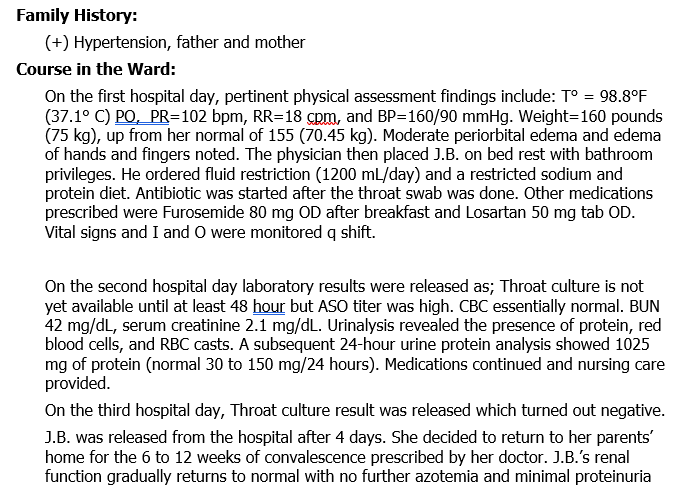CASE SCENARIO ACUTE GLOMERULONEPHRITIS: J.B., female 36 years old, single, a bus conductor was apparently well, until 4 days prior to admission, when she experienced dizziness and headache while at work. Once parked at the terminal, she asked to be checked in the clinic and BP was recorded at 180/100 mmHg, which was unusual since she usually had a BP of 90/60 mmHg. Clonidine 75 mcg was placed sublingual, which reduced her BP to 150/90 mmHg. She was then advised by the company nurse to go home. 2 days PTA, a co employee noticed that her eyes were puffy and even kidded if she broke off with her boyfriend. She just shrugged off the comment and did her usual chores. Few hours PTA, while preparing for work, she noticed blood in the toilet bowl after urinating, which prompted her to seek consult and eventually admission. Her history is essentially negative for past kidney or urinary problems. She admitted that her eyes seemed a little puffy, but she thought this was due to lack of sleep and fatigue. She has eaten little the past 2 days, but was not alarmed because she is on a diet. She related though having had a “pretty bad” sore throat a couple of weeks before admission. Since she was busy with work, she self medicated with a few antibiotics she had from a previous bout of Streptococcus throat infection, increased fluid intake and gargled with Bactidol. The sore throat resolved, and she felt well until the dizziness and headache episode. The nurse admitting J.B., upon further assessment, gathered that aside from blood, she likewise noticed brown and foamy urine a day prior. This prompted the attending physician to admit her in the wards and ordered a throat culture, ASO titer, CBC, BUN, serum creatinine, and urinalysis. (more details pls see attached pics thank you) QUESTIONS: 1. What are the subjective and objective data from this case scenario? 2. How did J.B.’s use of previously prescribed antibiotics to treat her sore throat affect her risk for developing poststreptococcal glomerulonephritis? 3. What additional risk factors did J.B. have for developing glomerulonephritis?
CASE SCENARIO ACUTE GLOMERULONEPHRITIS: J.B., female 36 years old, single, a bus conductor was apparently well, until 4 days prior to admission, when she experienced dizziness and headache while at work. Once parked at the terminal, she asked to be checked in the clinic and BP was recorded at 180/100 mmHg, which was unusual since she usually had a BP of 90/60 mmHg. Clonidine 75 mcg was placed sublingual, which reduced her BP to 150/90 mmHg. She was then advised by the company nurse to go home. 2 days PTA, a co employee noticed that her eyes were puffy and even kidded if she broke off with her boyfriend. She just shrugged off the comment and did her usual chores. Few hours PTA, while preparing for work, she noticed blood in the toilet bowl after urinating, which prompted her to seek consult and eventually admission. Her history is essentially negative for past kidney or urinary problems. She admitted that her eyes seemed a little puffy, but she thought this was due to lack of sleep and fatigue. She has eaten little the past 2 days, but was not alarmed because she is on a diet. She related though having had a “pretty bad” sore throat a couple of weeks before admission. Since she was busy with work, she self medicated with a few antibiotics she had from a previous bout of Streptococcus throat infection, increased fluid intake and gargled with Bactidol. The sore throat resolved, and she felt well until the dizziness and headache episode. The nurse admitting J.B., upon further assessment, gathered that aside from blood, she likewise noticed brown and foamy urine a day prior. This prompted the attending physician to admit her in the wards and ordered a throat culture, ASO titer, CBC, BUN, serum creatinine, and urinalysis. (more details pls see attached pics thank you)
QUESTIONS:
1. What are the subjective and objective data from this case scenario?
2. How did J.B.’s use of previously prescribed antibiotics to treat her sore throat affect her risk for developing poststreptococcal glomerulonephritis?
3. What additional risk factors did J.B. have for developing glomerulonephritis?
4. Why was J.B. placed on a restricted fluid and restricted sodium and protein diet? Why was the antibiotic started after the throat culture?


Trending now
This is a popular solution!
Step by step
Solved in 5 steps






